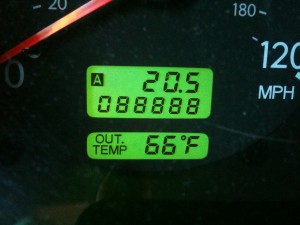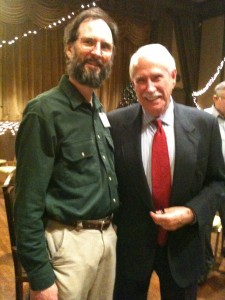
Whenever our family went driving when I was young, I checked the odometer to see whether an interesting number was coming up. For example, perhaps we were about to hit 45678.9 or 50505.0. My brother and I would get in position so we could watch the magic moment. If you read my previous post about numbers, you are already nodding your head in recognition.
Those of you who are a certain age will remember that automobiles used to have mechanical odometers—mechanical!—including a wheel for tenths of a mile. Because the tenths wheel was in constant movement, the precise number 45678.9 lasted only for the briefest moment, and then was over. Are we there yet?
The grand prize, of course, was when the odometer rolled over from 99999.9 to 00000.0. That only happened twice: once in our old 1967 Chevy station wagon, and once in my own car. These days, odometers don’t have a tenth digit, but do have a hundreds-of-thousands digit. This means that I’ll never have my car long enough to see the odometer reach 888888, and so must settle for 088888 (in the old days, I could have had 88888.8).
I’m not sure how to explain my fascination for symmetrical odometer readings when I have so little for seemingly symmetrical calendar dates such as 11/11/11. Part of it is that the date is really 11/11/2011, which isn’t symmetrical at all. Or that the same date is 14 Cheshvan 5772 in the Hebrew calendar, or 12.19.18.15.14 in the Mayan calendar, which aren’t symmetrical either. On the other hand, the odometer readout could be in base 8, in which case 88888 would be 255470, or in base 16, which would be 15B38. So the next time your insurance broker asks you what the odometer reading is, ask him “base 8 or base 16?”


